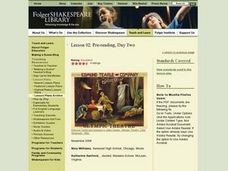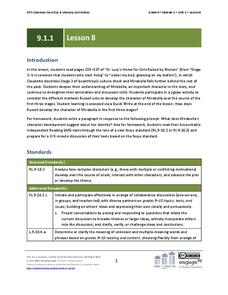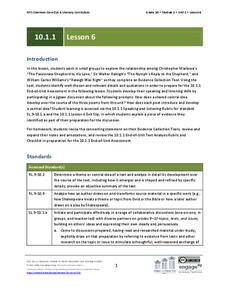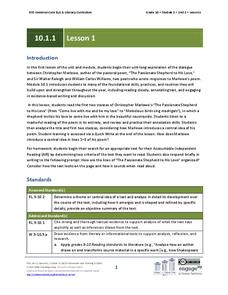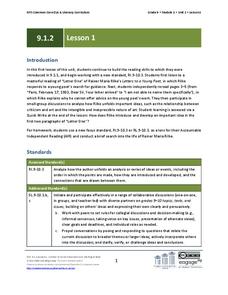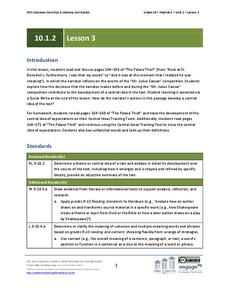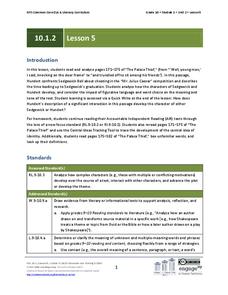Curated OER
The Ethics of Outsourcing to China
After viewing clips from a documentary on factory work in China and US outsourcing, learners have a fishbowl discussion. They work in groups to build both personal points of view and strong arguments on the effects of outsourcing in...
Curated OER
Artistic Interpretation of a Classic: The Author's Role
Reading the original Hans Christian Andersen tale of “The Little Mermaid” and viewing the Great Performances: The Little Mermaid from the San Francisco Ballet video offers class members an opportunity to consider how artistic decisions...
Curated OER
Persuasive Speech in Julius Caesar
After reading Julius Caesar 1.2 and 1.3, break your class into pairs for this role-play. Each pair will receive one of four prompts (or more, if you create additional examples), in which one person tries to persuade the other to do...
Curated OER
Leaders, Laborers, and Other Perspectives of World War II
How did the women in France feel about their country’s involvement in World War II? Class groups are assigned a country involved in WWII, and individuals within the group adopt the point of view of leaders, laborers, businessmen, women,...
EngageNY
Grade 11 ELA Module 2: Unit 2, Lesson 6
How did the women's rights movement create a ripple effect, improving the lives of future generations? Scholars read and analyze paragraphs 11-12 of "An Address by Elizabeth Cady Stanton," in which the author emphasizes the importance of...
EngageNY
Grade 11 ELA Module 2: Unit 2, Lesson 11
In Audre Lorde's poem "From the House of Yemanjá," the speaker describes her mother's two faces, adding a whole new meaning to the phrase "two-faced." Pupils first read the final stanza of the contemporary poem. With a Quick Write, they...
Curated OER
Shakespeare: Julius Caesar
Before your high schoolers read Julius Caesar, have them complete this thought-provoking activity! To familiarize them with some of the play's most important lines, break the class into pairs and have them create a skit around two lines...
Southern Nevada Regional Professional Development Program
Was Bias A Factor? Make an Argument
The ability to analyze an argument is a skill emphasized by the Common Core standards. Offer your class an opportunity to develop and hone their skills by providing them the testimonies in an Oregon court case. After reading the facts of...
Curated OER
Adapting "List/Group/Label" to Literature
Need a prereading activity in line with the Common Core Standards for Language? Although designed for grades 11 and 12, the procedure detailed in this resource could be used with most grade levels. Prior to reading, select 20 – 25 words...
EngageNY
Grade 9 ELA Module 1, Unit 1, Lesson 7
A story about feral girls raised by werewolves will have some interesting character development! Track how the girls and their teachers act, speak, and change with a lesson focused on Karen Russell's "St. Lucy's Home for Girls Raised by...
EngageNY
Grade 9 ELA Module 1, Unit 1, Lesson 8
You can often track a character's development based on others' reactions to their words or actions. Using Karen Russell's "St. Lucy's Home for Girls Raised by Wolves," ninth graders work in a jigsaw activity to analyze how Mirabella's...
EngageNY
Grade 9 ELA Module 1, Unit 1, Lesson 1
Word choice can drastically alter the tone of a piece of writing. Ninth graders read Karen Russell's short story "St. Lucy's Home for Girls Raised by Wolves" and use textual evidence to help them analyze how word choice affects their...
EngageNY
Grade 10 ELA Module 1: Unit 1, Lesson 6
Wrap up your literary analysis unit with a discussion activity as tenth graders prepare for an end-of-unit assessment. After they have read and annotated Christopher Marlowe's "The Passionate Shepard to His Love," Sir Walter Raleigh's...
EngageNY
Grade 10 ELA Module 1: Unit 1, Lesson 1
Can authors speak to each other across works, genres, and centuries? Study the conversation between Christopher Marlowe in his poem "The Passionate Shepherd to His Love" and the responses by Sir Walter Raleigh and William Carlos Williams...
EngageNY
Grade 10 ELA Module 1: Unit 3, Lesson 1
The Joy Luck Club by Amy Tan is an illustrative source of rich prose, deep character development, and strong literary themes. Use two of the book's key chapters, which focus on Waverly's relationship with chess and with her mother, to...
EngageNY
Grade 10 ELA Module 1: Unit 3, Lesson 5
Even the most rigid expectations come from a place of deeply held values. In a key chapter of Amy Tan's The Joy Luck Club, explore the ways that Jing-Mei's mother's parental expectations affect her relationship with Jing-Mei. Tenth...
EngageNY
Grade 9 ELA Module 1, Unit 2, Lesson 1
Where does a writer find inspiration? "Go into yourself," says Rainer Maria Rilke in "Letter One" from Letters to a Young Poet. Readers of Rilke's letter to Franz Xaver Kappus examine the words and figurative language Rilke uses to...
EngageNY
Grade 10 ELA Module 1: Unit 2, Lesson 2
Class members continue their reading of Ethan Canin's "The Palace Thief," focusing on how the relationship between the narrator and Sedgewick changes after the narrator meets Sedgewick's father.
EngageNY
Grade 10 ELA Module 1: Unit 2, Lesson 3
Readers of "The Palace Thief" continue examining Ethan Canin’s short story and consider how the narrator's actions develop the central idea of how one's expectations and the expectations of others influence behavior.
EngageNY
Grade 10 ELA Module 1: Unit 2, Lesson 5
Readers of "The Palace Thief" focus on how the author's descriptions and word choices reveal the characters of the narrator, Sedgewick, and the senator.
EngageNY
Grade 10 ELA Module 1: Unit 2, Lesson 11
Is identity unchanging? Do events in our childhood forever influence our character? Groups ponder these questions as they examine Ethan Canin’s short story “The Palace Thief.”
EngageNY
Grade 10 ELA Module 1: Unit 2, Lesson 12
As the class concludes its close reading of “The Palace Thief,” groups consider how the narrator's character has changed throughout Ethan Canin’s short story.
EngageNY
Grade 10 ELA Module 1: Unit 2, Lesson 6
Is history "little more than a relic," as one of the characters in "The Palace Thief" contends? Has Hundert's love of antiquity kept him from changing with the times? Readers consider how the author uses these conflicting views to...
EngageNY
Grade 10 ELA Module 1: Unit 2, Lesson 9
Do our childhood circumstances significantly shape us? As the close reading of “The Palace Thief” continues, groups examine how the results of the first "Mr. Julius Caesar" competition influenced the development of the characters in...








